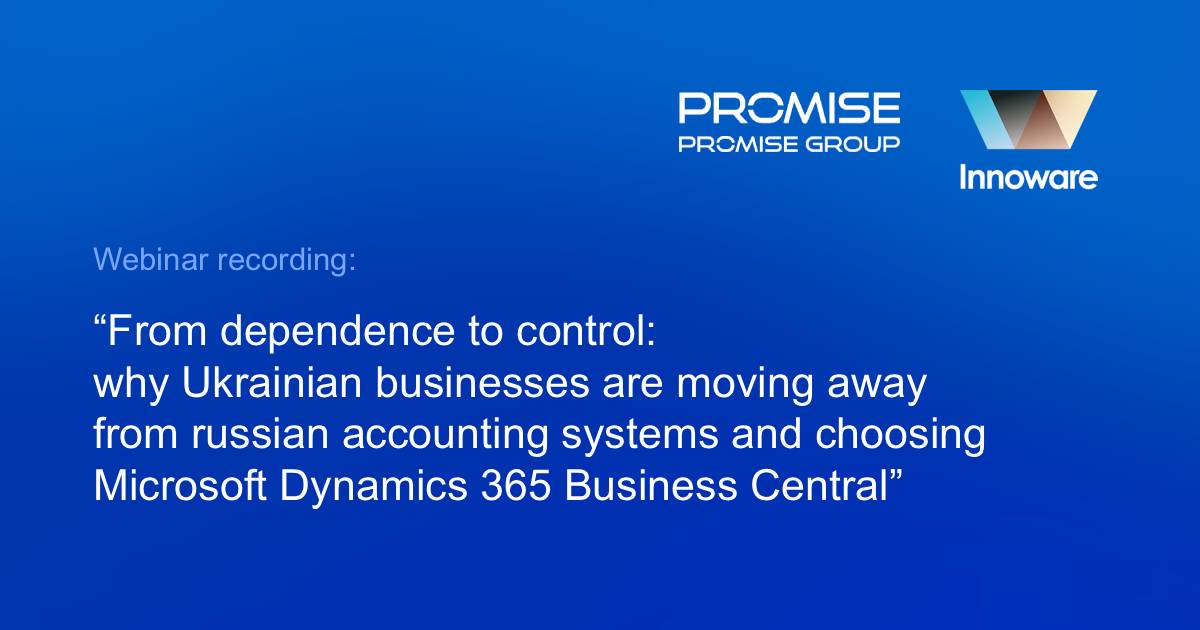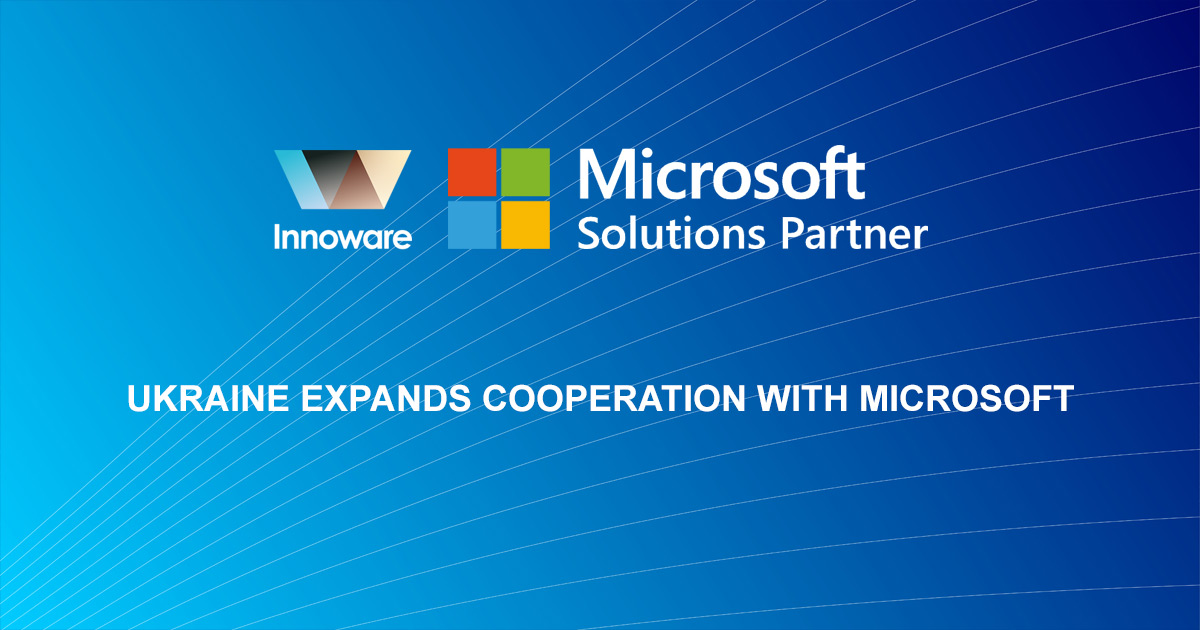
How to choose the effective ERP system and properly organize the project of its implementation
In his article for The Page, Innoware founder and CEO Dmytro Popinako told how to choose the optimal ERP system and properly organize its implementation project. He also shared his experience on how to choose a consulting partner for implementation and achieve a successful project completion.
Today, many Ukrainian companies are trying to get rid of russian software products for enterprise management (ERP), and upgrade to Western or Ukrainian software analogues. However, business migration from 1C or other russian systems to alternative solutions is equivalent to a new, full-fledged ERP implementation project. We will discuss in this article how Ukrainian companies can choose an ERP solution that will be relevant for many years to come and how to successfully implement it.
When planning an upgrade project from russian software to more modern and secure ERP systems, domestic organizations often ask themselves the following questions:
– how to choose the optimal product for enterprise resource planning?
– how to properly organize an implementation project?
– how to choose a consulting and integration partner?
The answers to these questions are very important indeed. But many Ukrainian companies, in their efforts to get answers to them, pay attention to details that are not important because they do not have enough experience. For example, today it is not very relevant to choose a product based on functionality. If earlier it was possible to say that one system has a certain necessary functionality, and the other does not have it, now ERP systems are so multifunctional that they contain almost any tools. True, they are quite expensive, because they are aimed at corporate level companies.
But if the product is intended specifically for medium-sized businesses, then there is usually exactly the functionality that is necessary for the SMB segment. This allows us not to dramatically increase the cost of owning the system.
So how to choose the optimal ERP system?
In recent years, the big players in the ERP market have had enough time and resources to invest in the development of any functionality that end users might need.
Therefore, competition today is not at the level of individual software products, but at the level of platforms and ecosystems. And in the future (which is already noticeable) we will observe a competition between software mega giants with developed ecosystems.
Of course, certain niche players will appear on the market, but, most likely, sooner or later they will be absorbed by one of the big vendors. In the future, there will probably not be many powerful players left on the ERP market: Microsoft, Google, Apple, Amazon and Oracle. So… You will have to choose from among them.
Based on this view of the future, it is advisable for SMB enterprises to choose an ERP system from among the products of those vendors whose ecosystem they plan to use in the future. For example, in the Ukrainian market, the most powerful positions from the point of view of the ecosystem are occupied by Microsoft. The company has its own OS, several business and office applications, and a cloud service that is quite popular in Ukraine. In addition, Microsoft offers two modern, extremely developed and powerful ERP systems that can replace 1C in medium-level and large enterprises.
Which partner you choose – that’s the result you will have
A professional ERP system implementation partner is one of the most important keys to a successful project. Unfortunately, Ukrainian business representatives, in their majority, do not have sufficient experience in the implementation of ERP systems, since domestic companies usually bought solutions from a russian software supplier, and then gradually developed them either on their own or with the help of foreign developers. This is a problem, because today, based on their many years of previous experience, at the stage of choosing a consulting partner, Ukrainian companies try to evaluate it according to the criteria by which they once chose a 1C supplier and by which, in fact, they should not choose a consulting partner.
We recommend when choosing an implementation partner, you pay attention to the characteristics that are used, for example, when choosing lawyers: they are chosen by brand, number of successful cases and years of work. The same criteria should be applied to the selection of a partner-consultant for the implementation of the ERP system.
First, the implementation project is consulting services, not development. Therefore, it is necessary to look for a partner who has sufficient experience and developed methodology. And it is the implementation methodology that the client should analyze at the stage of choosing an implementation partner to understand whether it will be successful for his project and whether the company will receive benefits during and after implementation.
The organizational part is important
Another point worth emphasizing is the organizational part of the project. It’s very important and covers the interaction scheme of the implementation team from the side of the client and representatives of the consulting partner.
Particular attention should be paid to the formation of the project team from the client’s side, since these specialists must have enough knowledge and time that they can devote to the implementation process. After all, the project consists of tasks to be performed by consultants from the consulting partner’s side, and part of the work undertaken by the client himself. If any of these tasks are not completed, the project stops and both teams wait for it to be completed.
Unfortunately, top managers of companies in which ERP systems are implemented quite often do not pay enough attention to such projects, and in vain, because these are strategically significant works for the company, in which top-level managers should be involved.
It’s also very important to note the trust factor. If the client has already chosen a team of consultants, then it is necessary to listen to their advice in terms of organizational measures for the implementation of the project and related issues.
After all, they can share the rich experience accumulated over years of work. When there is a question of optimizing business processes during ERP implementation.
In fact, the optimization of business processes and the implementation of ERP are two separate tasks, but a certain adaptation of the company’s business processes is not excluded at the stage when the requirements are analyzed and the way to implement them in the design of the new system.
If certain requirements of the client cannot be implemented using the standard functionality of the new system, then there is a choice: either to modify the system itself, or to change the business process. And we advise first seeing if it is possible to change the business process itself, because it is simpler and cheaper. After all, the modification of the ERP system usually leads to an increase in the cost of ownership and the implementation project.
At the same time, changing the business process is also not always possible. Therefore, in almost every large-scale implementation project at a large enterprise, ERP system modifications are performed, but it is much easier for small companies to adjust their business processes to those functions that are already present in the ready functionality of the system.
And finally, I want to address the Ukrainian business community: if your company uses russian software, don’t delay! Don’t wait for an official ban on the use of russian systems or hacker attacks, look for opportunities, choose a solution and as soon as possible start the project of upgrade to a safe and modern software for your company.
Original version: Як підібрати оптимальну ERP-систему (thepage.ua)
INNOWARE USA
501 Silverside Rd, Ste 105, # 4995,
Wilmington, Delaware, 19809-1376,
United States
Tel.: +1(302)4672024
E-mail: info@innoware.com
INNOWARE UAE
Premises 407-FZBA 055, 4th Floor, Sheikh Rashid Tower, Dubai World Trade Centre,
Dubai, United Arab Emirates
Tel.: +971588894591
E-mail: info@innoware.ae
INNOWARE UKRAINE
3, Sholudenka St., office 204 (Cubic BC)
Kyiv, Ukraine, 04116
Tel.: +380(44)4902220
E-mail: info@innoware.com


